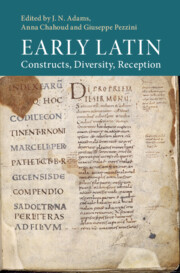Book contents
- Early Latin
- Early Latin
- Copyright page
- Dedication
- Contents
- Illustrations
- Tables
- Contributors
- Acknowledgements
- Abbreviations
- Chapter 1 Introduction: What Is ‘Early Latin’?
- Part I The Epigraphic Material
- Part II Drama
- Part III Other Genres and Fragmentary Authors
- Chapter 13 The Language of Early Latin Epic
- Chapter 14 Early Latin Prayers and Aspects of Coordination
- Chapter 15 Some Syntactic Features of Latin Legal Texts
- Chapter 16 Repetition in the Fragmentary Orators
- Chapter 17 How ‘Early Latin’ Is Lucilius?
- Chapter 18 Greek Influences on Cato’s Latin
- Chapter 19 Greek Loanwords in ‘Early Latin’
- Part IV Reception
- Bibliography
- Index Verborum
- Index of Non-Latin Words
- Index Locorum Potiorum
- Subject Index
Chapter 18 - Greek Influences on Cato’s Latin
from Part III - Other Genres and Fragmentary Authors
Published online by Cambridge University Press: 27 July 2023
- Early Latin
- Early Latin
- Copyright page
- Dedication
- Contents
- Illustrations
- Tables
- Contributors
- Acknowledgements
- Abbreviations
- Chapter 1 Introduction: What Is ‘Early Latin’?
- Part I The Epigraphic Material
- Part II Drama
- Part III Other Genres and Fragmentary Authors
- Chapter 13 The Language of Early Latin Epic
- Chapter 14 Early Latin Prayers and Aspects of Coordination
- Chapter 15 Some Syntactic Features of Latin Legal Texts
- Chapter 16 Repetition in the Fragmentary Orators
- Chapter 17 How ‘Early Latin’ Is Lucilius?
- Chapter 18 Greek Influences on Cato’s Latin
- Chapter 19 Greek Loanwords in ‘Early Latin’
- Part IV Reception
- Bibliography
- Index Verborum
- Index of Non-Latin Words
- Index Locorum Potiorum
- Subject Index
Summary
Cato the Censor is commonly accepted as both the founder of Latin prose and as an outspoken critic of everything Greek. The relationship between these two roles is one that deserves more investigation than it has received, especially in the area of his actual linguistic usage as opposed to his (largely reconstructed) ideology: recent studies have been longer on the latter than on his Latin words and syntax and the way they may have been influenced by the Greek language. Such studies as there are of Greek influence on Catos surviving Latin are few and old, and none are in English. This century’s significant advances in our knowledge of the interaction between Latin and Greek, as well as new editions of Cato, will be taken into account in this proposed study through a reassessment of Catos Latin with respect to his use of Greek-based vocabulary (whether introduced into Latin by him or not) as well as on the possible influence of Greek phonology, morphology and syntax. Conversely, evidence of Catos avoidance of Greek (or shared) elements already in use in Latin will also be examined.
- Type
- Chapter
- Information
- Early LatinConstructs, Diversity, Reception, pp. 373 - 385Publisher: Cambridge University PressPrint publication year: 2023

